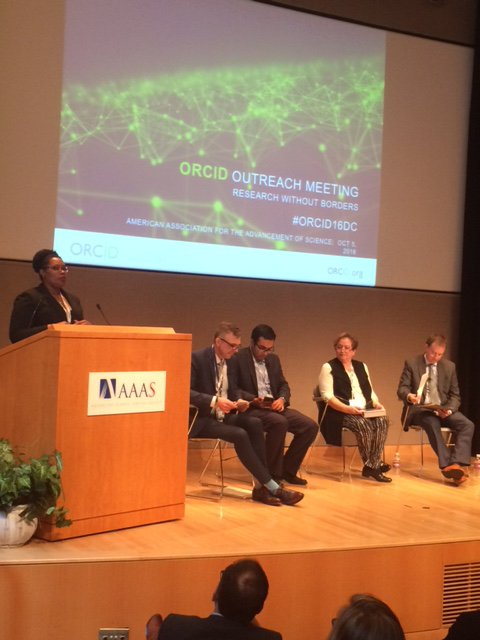Our 5 October Outreach Meeting at the American Association for the Advancement of Science (AAAS) office in Washington, DC was themed “Research without borders.” Over 150 people joined us, to explore applications of ORCID across the research landscape. Unsurprisingly, given the location, this included many attendees from scholarly and professional associations and federal funding agencies, as well as research managers and administrators, librarians, foundations, vendors, publishers, and researchers.
The meeting kicked off with a keynote by Marcia McNutt, formerly editor-in-chief of AAAS and now president of the US National Academy of Sciences, who spoke about the importance of widespread ORCID adoption, and in particular its relevance in promoting research integrity. Next up was the ORCID team, with an overview of 2016 achievements – ORCID is now adopted nationally in 11 countries! – and our plans for 2017.
In the lightning demo sessions, attendees got to see how ORCID is being used “in the wild”. Nine new ORCID integrations were on show from the American Geophysical Union, Digital Science/UberResearch, CHORUS, ProQuest/Pivot, Open Journal Systems, Redalyc, eJournal Press, Convey, and Editage – a great range that really demonstrate the breadth and depth of ORCID adoption in the research community. Attendees also got a sneak preview of one of the first three ORCID how-to videos that we will be launching shortly – more on our blog soon!
Over lunch, we experimented for the first time with topic tables – small group conversations led by one of our program committee members. Topics included ORCID in physical sciences, humanities and social sciences, or life sciences; ORCID consortia; ORCID in publishing, funding, or research institutions/scholarly associations. Look out for more topic tables at future meetings.
Our two afternoon parallel sessions focused on communications and technology, two areas that are critical to ORCID’s success. The communications group worked on developing an ORCID elevator pitch, got tips on successful community engagement and outreach from Bob Conrad (Oak Ridge National Laboratory), Jane Holmquist (Princeton University), and Heath Marks (Australian Access Federation), and enjoyed a lively quiz-style ORCID myth-busting session. We’ll be publishing the questions they were asked, together with the answers, in a future blog post. Over in the technology session, attendees heard all about our new API v. 2.0 and learned about the most common ORCID API perks and pitfalls that our technology team encounters. Again, more on these shortly.
 The last session of the day – and one of the highlights – was an informal panel discussion on Why ORCID? Chaired brilliantly by Amanda Wilson of the US Department of Transportation, the panelists were Benjamin Brown (Department of Energy), Mohammad Asadilari (University of British Columbia), Michael Savelli (AAAS), and Christine Stamison (NorthEastern Research Libraries consortium). It was a lively and enjoyable discussion, with lots of audience participation, including more comments on the critical need for stakeholder buy-in – especially among researchers. Although reducing their admin burden is a significant benefit, we need to develop a wider value proposition about how ORCID can help researchers. More transparency around how the research infrastructure works, and ORCID’s role in it, will help.
The last session of the day – and one of the highlights – was an informal panel discussion on Why ORCID? Chaired brilliantly by Amanda Wilson of the US Department of Transportation, the panelists were Benjamin Brown (Department of Energy), Mohammad Asadilari (University of British Columbia), Michael Savelli (AAAS), and Christine Stamison (NorthEastern Research Libraries consortium). It was a lively and enjoyable discussion, with lots of audience participation, including more comments on the critical need for stakeholder buy-in – especially among researchers. Although reducing their admin burden is a significant benefit, we need to develop a wider value proposition about how ORCID can help researchers. More transparency around how the research infrastructure works, and ORCID’s role in it, will help.
Last but not least, everyone enjoyed more networking over cocktails – the perfect end to a meeting that, for us at ORCID, was all about engaging with you, our community.
Special thanks to our speakers, our sponsors, and our program committee!
